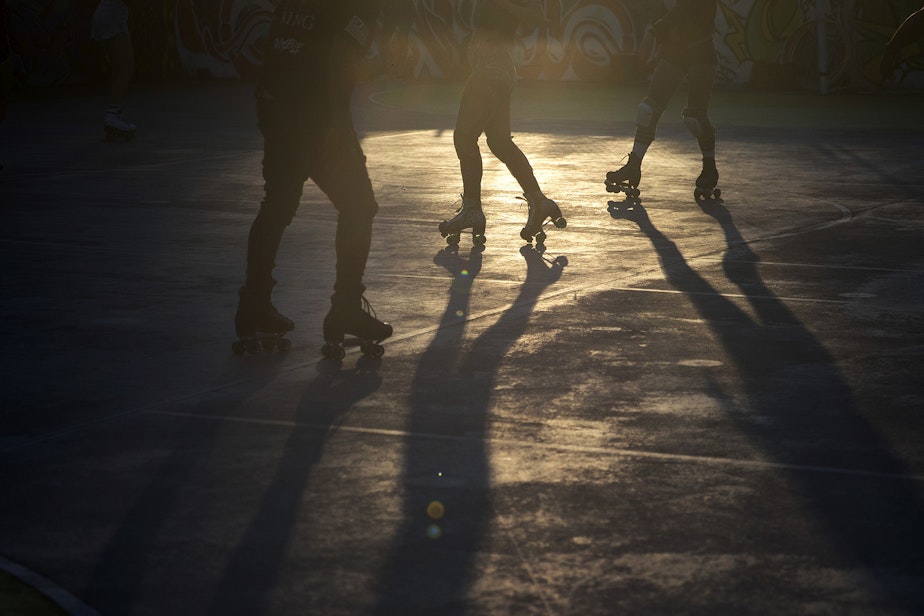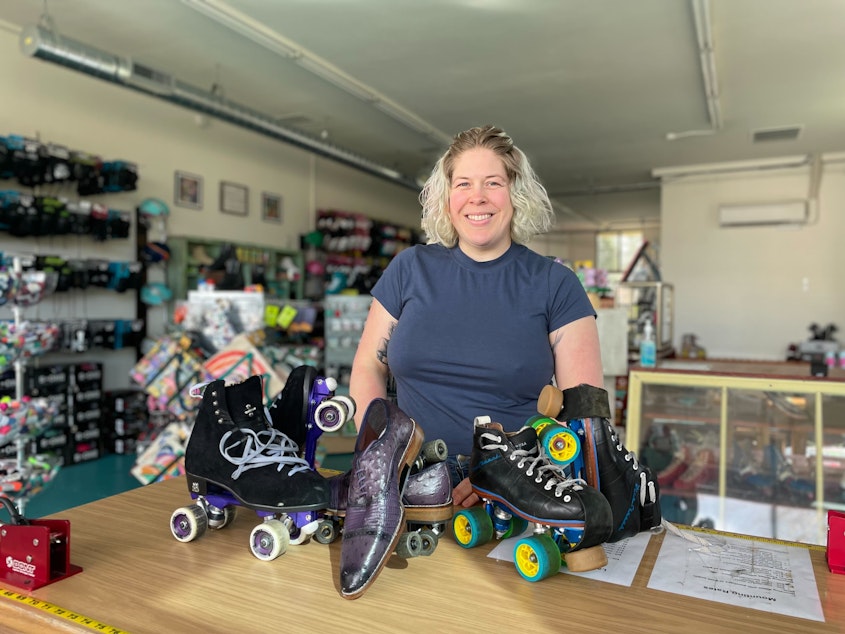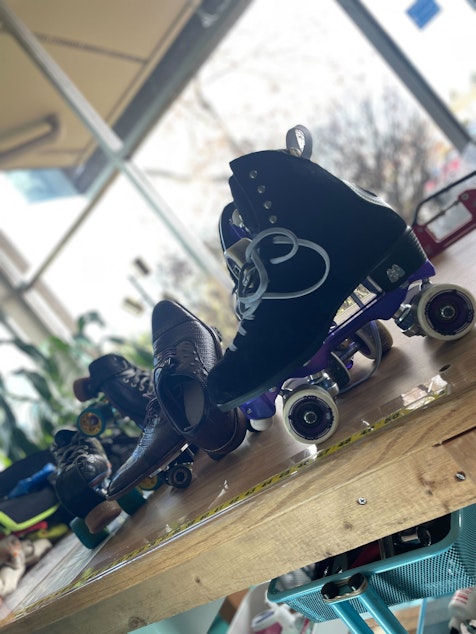Washington skate: history on 8 wheels

Washington state has a long history with roller skating. In fact, before we were even actually a state, we were building rinks.
And it goes beyond just a need to go fast and run into people.
Sheeza Brickhouse works at Get Your Bearings Skate Shop in Shoreline.
Obviously, that’s not the name on her driving license. It’s her derby name.
"I'm one of the founders of the Bellingham Roller Betties," Brickhouse said. "And then I graduated from Western in 2008, and moved down here to Seattle and joined Rat City, and skated there for a long time until I got in a car accident and had spinal damage."
Brickhouse has built a life around roller skates. She’s skated, she’s coached skaters, and now, she makes skates.
She said it began when her mom needed a safe place to drop her off, while she was at work.
Sponsored
"Skating for me a lot of times was somewhat a necessity for my mom, because it was very cheap child care for her to take me to the rink, because she was a single mom," Brickhouse said.
But it quickly became something she loved.
"I always say it felt freeing to roller skate, because you could just can go fast and you feel like wind in your hair," she said.
Roller skating saw a recent resurgence during the pandemic. As people looked for something they could safely do outside, roller skating, and particularly roller dance, became an outlet.
But skating is more than just exercise or fun. Brickhouse says the derby community has a strong, pro-LGBTQ stance, and that she marches and has fundraised many times on skates for the community.
Sponsored
She said it's important, because it's part of skate's history.
"And we can't forget that because we wouldn't have skating where it is without that history," she said.

A new exhibit at the Washington State Historical Society explains that the rise and fall of skating’s popularity in Washington is often tied to major historical events —from desegregation to the women’s suffrage movement.
Lead Curator Gwen Whiting said Washington's connection with skating makes it unique.
Sponsored
"Up and down the I-5 corridor, for most of our history, you know, we've had some of the greatest number of skating rinks in the nation," Whiting said.
That's due in part to Washington's rainy weather — when you need somewhere your kids can go when it's cold and wet outside, a skate rink is a great option.
In fact, the state has had roller rinks since before it was a state.
"In those early days, skating did tend to be a little bit elitist," noted Whiting. "But pretty quickly, as technology advanced, and as things just shifted, skating becomes one of those things that becomes more open, particularly when outdoor skates become a thing."
Skating's accessibility provided movement and freedom and had an impact on early activism in the area.
Sponsored
Many women began skating, and finding avenues into professional sports via roller derby, before it was considered an acceptable past time.
Whiting said roller rinks were also a center for fighting segregation.
"Some of the earliest sit-down protests were actually skate and protests — where you have people coming to the rinks and saying, 'Hey, you know, everybody should be able to skate'."
The Washington Historical Society's new exhibit, "Skate: Rinks, Derbies & Discos in Washington Skate History," will be up until Aug. 20, 2023.

Sponsored
Former pro-skater Maurice Sanders remembers some of that history — he lived it. Sanders, known as Quadzilla LK in the derby world, grew up going to the Tacoma Roller Dome in the '70s.
"In the black community, specifically, there was always the rhythm style, dance, skating, jam, skating, roller dance kind of thing," he said.
But, as Sanders got older, he began to have access to speed skating. So, he tried it out.
It earned him an invitation to the X Games in the '90s.
"I was skating from Parkland to Southfield Puyallup, to the bottom of Puyallup there," Sanders said. "And I got pulled over by a cop for speeding down South Hill."
Sanders said he was going 53 miles per hour.
"Somebody called me up said, 'Hey, you need to come to the X Games and do the downhill part,'" he said. "So that got me my first invite to the to the first X Games that they had out in Rhode Island."
From there, Sanders toured as an inline skater — he was known for being able to jump over 14 people laying down.
He starred in a TV show called "Roller Jam" on Spike TV. And, when the inline craze died down around 2000, he moved over to derby, working with Seattle's Rat City derby team in its early years.
The world of skating is changing. While the sport saw a rise in popularity during the pandemic, rinks have been shutting down across the state. There aren’t any rinks in Seattle, anymore. The closest is Southgate in White Center.
Most parents can’t just drop their kids off for cheap entertainment. Sheeza Brickhouse, out in Shoreline, says it’s made skating less accessible.
"There were so many more rinks back then," she said. "And it was so cheap and every Friday night, there was a huge skating event and sometimes overnights. And the indoor skating no is not more accessible. It is less accessible now."
But Sanders says even as it’s getting less accessible, there’s still a lot of interest, even among younger generations. They're finding out about the sport through media, like Tiktok or Disney.
And Sanders notes that while permanent rinks are on the decline, pop-up rinks are becoming more popular.
But no matter what the rinks look like, both Sanders and Brickhouse say they’ll continue to skate — because they have to.
"I don't have a choice," Sanders said. "It's just what I do. It's what I am. I like skating for the simple fact of skating is just, it's a happy place."
Brickhouse agreed.
"There's the music, the community, just the feeling of being on skates," she said. "I keep saying it's just so freeing. It feels free."





